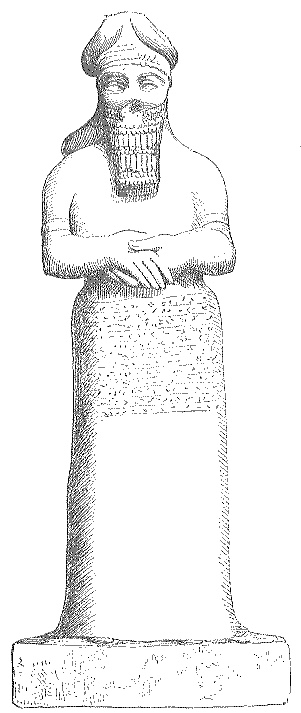The Gods Fear Zu
“A long but broken text explains why it was that he had to take refuge in the mountain of ‘Sabu under the guise of a bird of prey.
We learn that Zu gazed upon the work and duties of Mul-lil;
“he sees the crown of his majesty, the clothing of his divinity, the tablets of destiny, and Zu himself, and he sees also the father of the gods, the bond of heaven and earth.
The desire to be Bel (Mul-lil) is taken in his heart; yea, he sees the father of the gods, the bond of heaven and earth; the desire to be Bel is taken in his heart:
‘Let me seize the tablets of destiny of the gods, and the laws of all the gods let me establish (lukhmum); let my throne be set up, let me seize the oracles; let me urge on the whole of all of them, even the spirits of heaven.’
So his heart devised opposition; at the entrance to the forest where he was gazing he waited with his head (intent) during the day.
When Bel pours out the pure waters, his crown was placed on the throne, stripped from (his head). The tablets of destiny (Zu) seized with his hand; the attributes of Bel he took; he delivered the oracles.
(Then) Zu fled away and sought his mountains. He raised a tempest, making (a storm).”
Then Mul-lil, “the father and councillor” of the gods, consulted his brother divinities, going round to each in turn. Anu was the first to speak. He
“opened his mouth, he speaks, he says to the gods his sons: ‘(Whoever will,) let him subjugate Zu, and (among all) men let the destroyer pursue him (?).
(To Rimmon) the first-born, the strong, Anu declares (his) command, even to him: …’0 Rimmon, protector (?), may thy power of fighting never fail! (Slay) Zu with thy weapon. (May thy name) be magnified in the assembly of the great gods. (Among) the gods thy brethren (may it destroy) the rival. May incense (?) (etarsi) be offered, and may shrines be built!
(In) the four (zones) may they establish thy strongholds. May they magnify thy fortress that it become a fane of power in the presence of the gods, and may thy name be mighty?’
(Rimmon) answered the command, (to Anu) his father he utters the word:
‘(0 my father, to a mountain) none has seen mayest thou assign (him); (never may) Zu play the thief (again) among the gods thy sons; (the tablets of destiny) his hand has taken; (the attributes of Bel) he seized, he delivered the oracles; (Zu) has fled away and has sought his mountains.'”
Rimmon goes on to decline the task, which is accordingly laid upon another god, but with like result.

George Rawlinson: Seven Great Monarchies Of The Ancient Eastern World, Vol 1. (1875)
The Chaldean god Nebo, from a statue in the British Museum.
http://www.totallyfreeimages.com/56/Nebo.
Then Anu turns to Nebo:
“(To Nebo), the strong one, the eldest son of Istar, (Anu declares his will) and addresses him: … ‘0 Nebo, protector (?), never may thy power of fighting fail! (Slay) Zu with thy weapon. May (thy name) be magnified in the assembly of the great gods! Among the gods thy brethren (may it destroy) the rival!
May incense (?) be offered and may shrines be built! In the four zones may thy strongholds be established! May they magnify thy stronghold that it become a fane of power in the presence of the gods, and may thy name be mighty!’
Nebo answered the command: ‘0 my father, to a mountain none hast seen mayest thou assign (him); never may Zu play the thief (again) among the gods thy sons! The tablets of destiny his hand has taken; the attributes of Bel he has seized; he has delivered the oracles; Zu is fled away and (has sought) his mountains.'”
Like Rimmon, Nebo also refused to hunt down and slay his brother god, the consequence being, as we have seen, that Zu escaped with his life, but was changed into a bird, and had to live an exile from heaven for the rest of time.”
A.H. Sayce, Lectures on the Origin and Growth of Religion as Illustrated by the Religion of the Ancient Babylonians, 5th ed., London, 1898, pp. 297-9.
